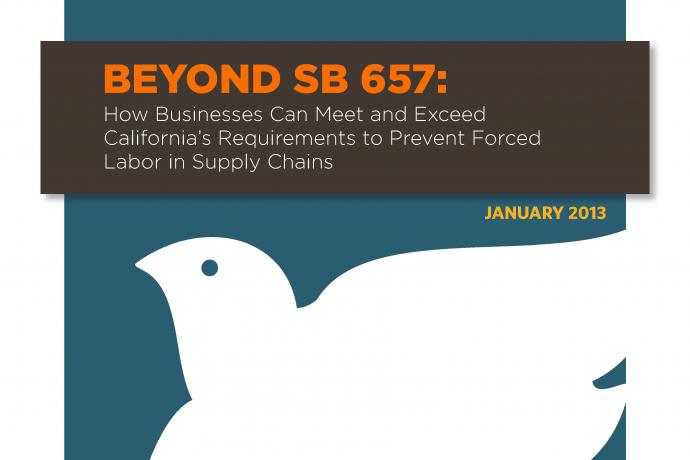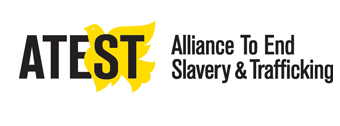New Report Helps Companies Meet and Exceed Requirements to Eliminate Human Trafficking from Supply Chains
Published 01-30-13
Submitted by Alliance to End Slavery and Trafficking (ATEST)

The Alliance to End Slavery and Trafficking (ATEST) issued a report today, “Beyond SB 657: How Businesses Can Meet and Exceed California’s Requirements to Prevent Forced Labor in Supply Chains." This path breaking report provides guiding principles for companies required to comply with California’s pioneering anti-trafficking law and for any company working to eliminate forced labor from their supply chains.
Under the California Transparency in Supply Chains Act (SB 657) retail sellers and manufacturers doing business in California and having $100 million or more in annual worldwide gross receipts must inform their consumers about what the company is doing to end human trafficking and slavery within their supply chains. ATEST estimates that approximately 3,200 businesses will likely be required to comply.
“If California were a separate country, California’s economy would be in the top 10 largest economies worldwide. Effective efforts to eliminate human trafficking in supply chains of companies doing business in the state could prevent untold numbers of people worldwide from being trapped into what is essentially modern slavery,” stated David Abramowitz, Director of ATEST and Vice President, Policy and Government Relations, Humanity United. “This report aims to make it easier for companies to comply and even go beyond California’s requirements to eliminate forced labor in supply chains and we hope it will serve as a model for action by all companies committed to having modern sourcing practices that avoid human trafficking.”
In the coming months, ATEST will release results of on-going research on hundreds of company disclosures in order to demonstrate how the law is—and is not—leading to changes in corporate practice around trafficking.
Key elements of the report include details on:
- tracing and verification of product supply chains
- quality supplier audits
- approaches to prevention
- internal accountability standards
- mapping high risk areas
- empowerment of workers and vulnerable communities
- employee and management training, and
- public posting of a company’s engagement towards eliminating human trafficking and slavery within supply chains
About ATEST
The Alliance to End Slavery and Trafficking (ATEST) is a coalition of U.S.-based human rights organizations working to end modern-day slavery and human trafficking in the United States and around the world. ATEST advocates for lasting solutions to prevent labor and sex trafficking, hold perpetrators accountable, ensure justice for victims and provide survivors with tools for recovery. ATEST member organizations include Coalition of Immokalee Workers (CIW), Coalition to Abolish Slavery & Trafficking (CAST), End Child Prostitution and Trafficking - USA (ECPAT-USA), Free the Slaves, International Justice Mission (IJM), Not For Sale, Polaris Project, Safe Horizon, Solidarity Center, Verité, Vital Voices Global Partnership, and World Vision. To learn more about ATEST, visit www.endslaveryandtrafficking.org.

Alliance to End Slavery and Trafficking (ATEST)
Alliance to End Slavery and Trafficking (ATEST)
The Alliance to End Slavery and Trafficking (ATEST) is a coalition of U.S.-based human rights organizations working to end modern-day slavery and human trafficking in the United States and around the world. We advocate for lasting solutions to prevent labor and sex trafficking, hold perpetrators accountable, ensure justice for victims and empower survivors with tools for recovery.
Our collective experience implementing programs at home and abroad provides our coalition an unparalleled breadth and depth of expertise. Together, we are committed to ensuring that:
- Corporations and government supply chains are free from human trafficking, forced labor and other forms of modern slavery.
- Corporations or governments that recruit and hire workers, directly or through labor brokers, do so ethically.
- Federal, state and local governments do not treat victims as criminals and instead, provide survivors with comprehensive services and access to justice.
Coalition Partners
ATEST member organizations include: Coalition of Immokalee Workers (CIW), Coalition to Abolish Slavery & Trafficking (CAST), End Child Prostitution and Trafficking - USA (ECPAT-USA), Free the Slaves, International Justice Mission (IJM), Not For Sale Campaign, Polaris Project, Safe Horizon, Solidarity Center, Verité, Vital Voices Global Partnership, and World Vision. Our alliance also includes one individual member: former U.N. Goodwill Ambassador Julia Ormond, president and founder of ASSET. Learn more about our coalition partners.
Policy Objectives
The scope of human trafficking and slavery has come into sharp focus over the past years with an estimated 27 million slaves worldwide--more than any other time in history. Human trafficking is also the second largest criminal enterprise in the world, generating over $32 billion in profits to traffickers annually according to some estimates. Below are our current policy priorities. Visit our Policy Objectives page to learn more.
- Trafficking Victims Protection Reauthorization Act of 2011 (S. 1301; H.R. 3244)
- Business Transparency on Trafficking and Slavery Act (H.R. 2759)
- Child Welfare Response to Human Trafficking Act of 2011 (H.R. 2730)
- Anti-Slavery And Human Trafficking Appropriations
- Foreign Labor Recruiters Legislation
- White House and Agency Initiatives
ATEST is led and supported by Humanity United, a foundation committed to building peace and advancing human freedom.

